Posted By Vinyl Frog On July 07, 2023
Car Window Tinting - Everything You Need to Know

In the grueling summer season, the question on everyone’s mind is: How to go out for a drive without having to bear the excruciating heat?
One way to do that is to install window tints on your car to provide a barrier against high temperature, glare and harmful UV rays, and make road trips much more pleasant and enjoyable.
If you plan to opt for car window tinting, you should do thorough research and be well aware of everything related to window tints. This blog provides you with all the information you need to get the process started.
What Is A Window Tint And The VLT Percentage?
Window tint refers to a thin film applied to the windows of vehicles to reduce the amount of sunlight and heat that enters through the glass. It is typically made of a polyester film that is treated with special dyes or coatings to achieve the desired level of tint.

The mechanism of a window tint is pretty straightforward. The polyester film has a coating which allows a certain amount of light to pass through. This darkness or tint density is measured as the Visible Light Transmission (VLT) percentage.
The lower the VLT percentage, the darker the tint and the less light it allows to pass through. The specific laws regarding window tint darkness vary by jurisdiction, so it's important to check the local regulations before applying tint to your vehicle.
Tints come with a certain VLT percentage to specify how dark the film will be. For example, a 20% VLT tint absorbs 80% of visible light and allows only 20% to pass through.
This is beneficial for reducing glare during driving and obstructing harmful UV rays from penetrating into the vehicle. This might also reduce visibility especially in low light conditions.

Window Tint Percentages
Benefits of Car Window Tinting
A simple tint endows your vehicle with numerous advantages. Firstly, the film absorbs most of the light leading to less sun exposure and blocking out UV rays. This in turn protects both the passengers and the driver from getting sunburnt and having to deal with glare while driving.
It also increases the lifespan of the interior cabin and upholstery. Cooler temperatures within the car lead to a comfortable driving experience. As a result, you will not have to spend a lot on fuel as you won’t turn on the air conditioning as much.

Another reason you should opt for a window tint is the privacy it offers. The blackened windows obstruct outsiders from peering into the vehicle. This stops potential robbers from viewing the valuables in the car. For women who feel uncomfortable driving alone, a tint offers a safer experience.
It also offers safety in case of an accident as the film keeps the window glass from shattering. The miniscule shards of glass can be harmful, but window tints will ensure that they do not come in contact with you.
The windows are also protected from scratches, dirt and debris which preserves the car’s resale value. Tinting ensures that you have a comfortable, cooler and safer environment for your daily commute.
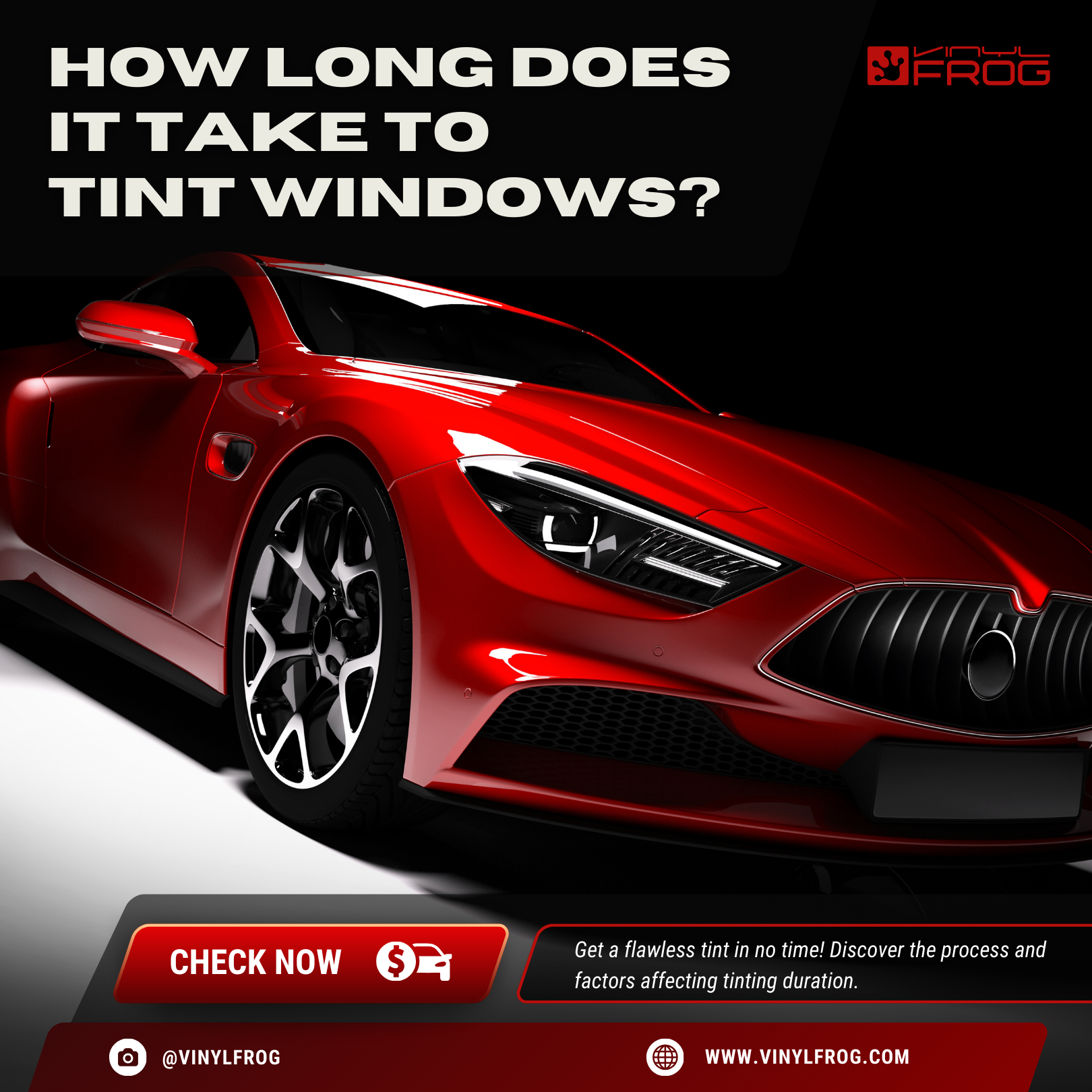
How Long Does It Take To Tint Windows?
Different Types Of Window Tints
There are various types of tints available on the market, each with their own advantages and unique characteristics. In order to decide which one suits your vehicle and needs the best, here is a short description of each tint.
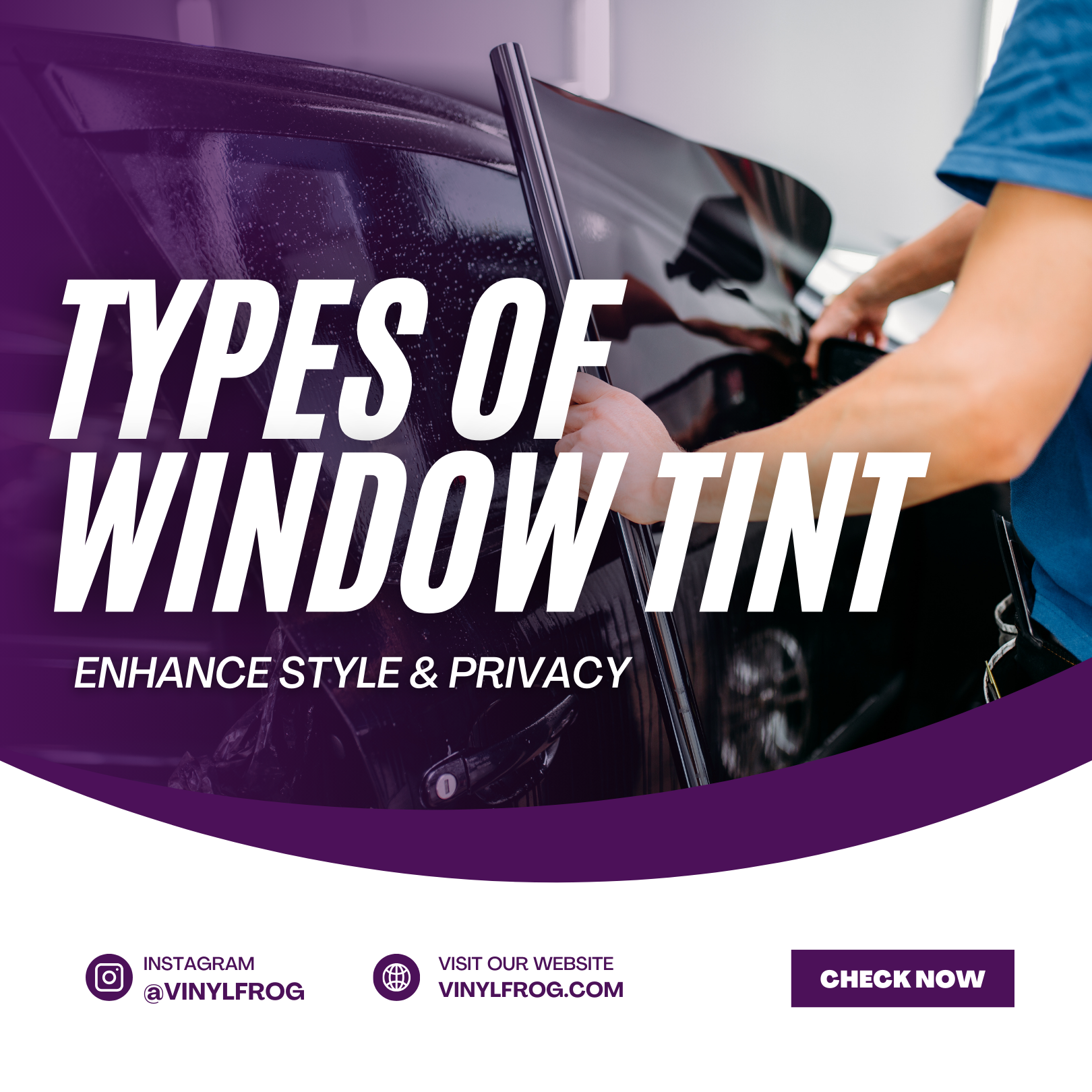
Types Of Window Tints
Dyed Window Tint
This tint is made using film with several layers of dye which creates the darkened appearance. Dyed tints are more style over substance as they do not last long and are prone to fading.
They do block out the sun, which makes for a comfortable driving experience but you will still be under the threat of harmful UV rays. Apart from the visual appeal, these films are popular as they are affordable as well.
Metalized Window Tint
These window tints are composed of metal particles that reflect sunlight so it does not enter the vehicle. The particles also provide a shiny and sleek look to the car’s windows.
Moreover, they strengthen the glass on the window and keep it from shattering. A downside of using metal in tints is that it interferes with radio and GPS signals.

Hybrid Window Tint
The combination of dyed and metalized tints is called hybrid. These films combine the best of both the products to provide a stylish yet functional choice. However, they are quite costly and may interfere with radio and GPS signals as well.
Carbon Window Tint
This is made up of carbon particles carefully blended into the film. This tint offers incredible strength and durability. It does not fade easily and is well equipped with blocking out sun and UV rays.
It offers a timeless matte finish to your windows and is darker in appearance as well. The con is that carbon tints do not come cheap, but they make up for it with their longevity.
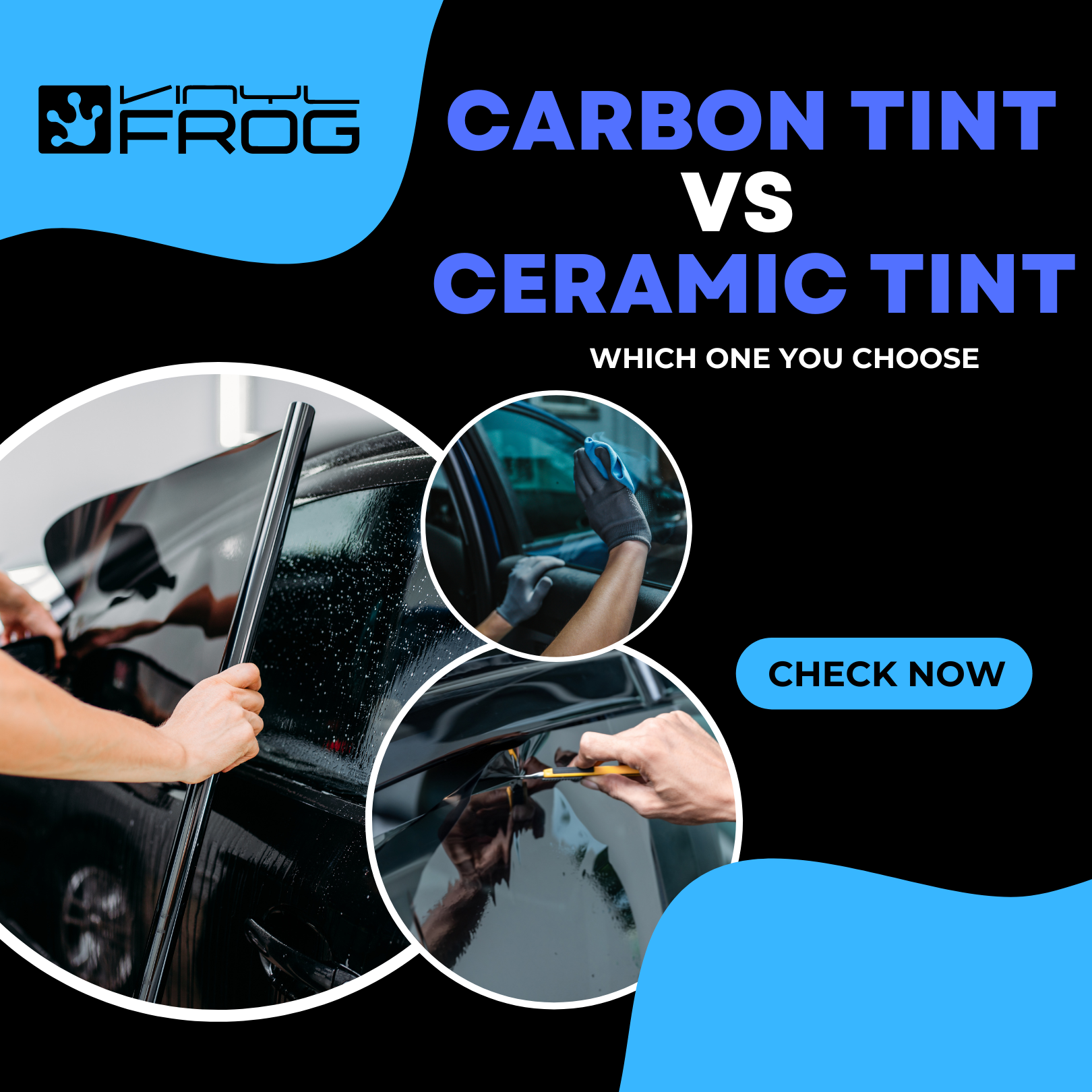
Carbon vs Ceramic Tint
Ceramic Window Tint
When it comes to keeping the sun out, ceramic tints take the cake. They are by far the most effective in reflection and insulation amongst others. This results in lower temperatures in the vehicle and higher fuel mileage.
They also provide glare reduction and safety as the glass is held together by the film keeping it from shattering. They are the best in keeping the harmful UV rays out. However, they are the most expensive option so only go for them if you are willing to make an investment.
Crystalline Window TInt
These tints are transparent but can block out UV rays. They do not provide a dark look and are not optimal for privacy or safety. If you want a clear look, this film is the one for you.
The Best Car Window Tints At Vinyl Frog
At Vinyl Frog, we carry premium quality window tints that will not only protect the windows and interior of your car but also give it a sleek and glamorous look. We have a wide variety of films, each with their own specialty.
They are made from premium-grade polyethylene terephthalate (PET) and are durable and long lasting. We offer different VLT percentages in these such as:

Best Car Window Tint - Buying Guide 2025
5% VLT: Better known as the limo tint, this film almost blacks out your windows to give utmost privacy. It blocks out 95% of visible light and is great for reducing heat. This tint has aesthetic appeal as well but is not allowed in most states.
20% VLT: This is another one of the darker tints. It allows only 20% of light to pass through your windows. It offers protection and privacy along with reduced glare. However, this may not be ideal for night drives as it can hinder clear visibility for the driver.
35% VLT: If you wish to get the most out of our window film without worrying about getting in trouble with the law, this one is the perfect option. It blocks out UV rays, protects your car from scratches and burglars, reduces glare and provides ample visibility.
50% VLT: Driving at night should not be a hassle with this film. This is also the perfect tint percentage that offers all the benefits without affecting visibility. Though onlookers will not be able to see into the car clearly, at night the road will be visible to you.
70% VLT: If battling the heat is your main concern, this is the perfect option. It is the lightest tint on the market and does not black out your windows. You will not get the style or the privacy, but your vehicle will be protected.
Along with that, you will not have to deal with glare and your windows will be both scratch and shatterproof.
Other Window Tint Percentages
There are some other VLT percentages in car window tints that you can find on the market. Here’s a brief lowdown:
0% VLT: 0% VLT window tints are designed to block out 100% UV rays, safeguarding you and your loved ones from their harmful effects. Not only that, but the complete blackout of the windows offers ultimate privacy and safety.
The added benefit of heat and glare reduction make for a comfortable and cool environment while driving. However, this tint is not legal unless you have prior approval for medical reasons.
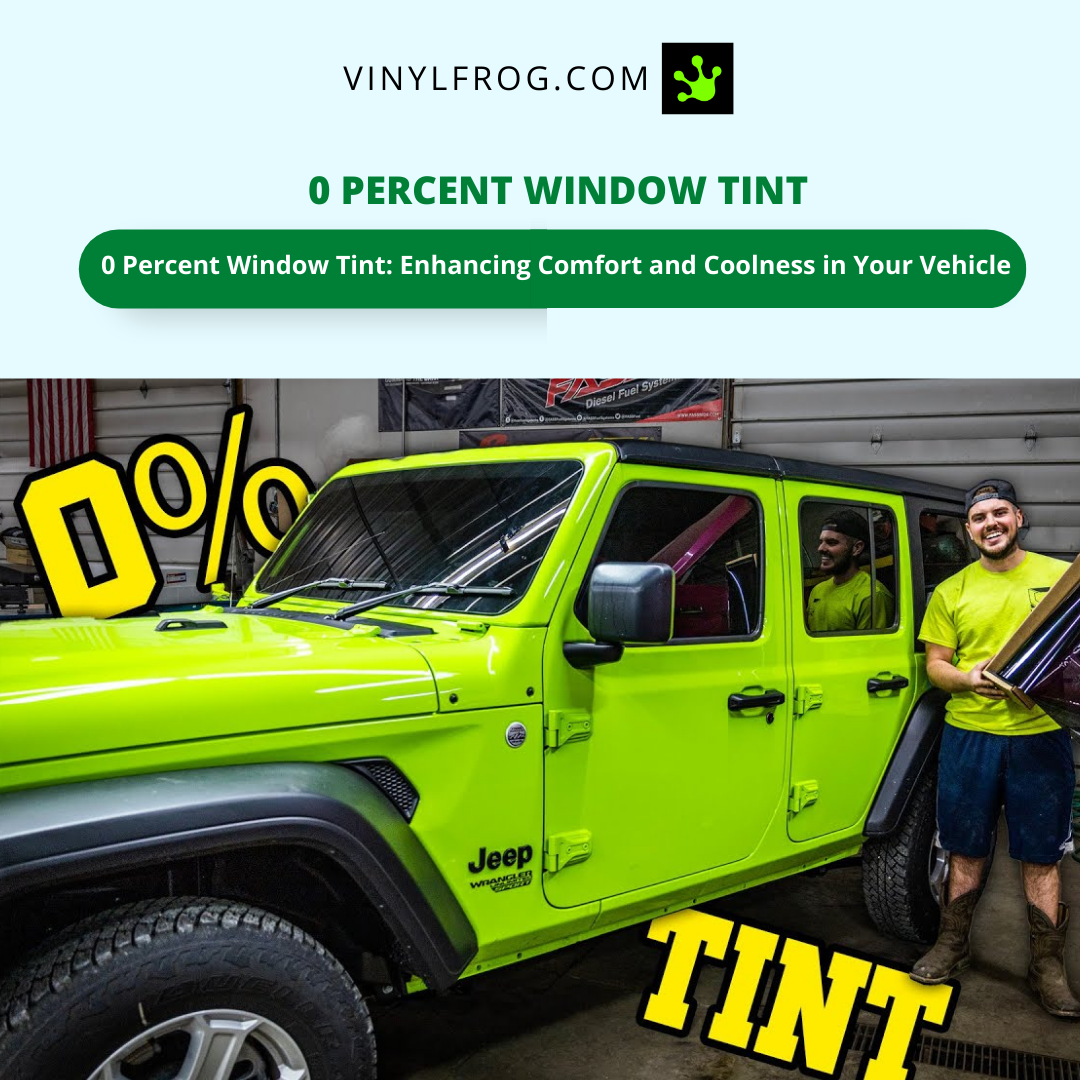
0 Percent Window Tint
10% VLT: 10% window tint strikes a balance between privacy and visibility. It is quite a dark shade that provides a higher level of privacy compared to lighter tint levels like 30% or 50%.
This makes it an excellent choice for individuals who do not want prying eyes while still having reasonable visibility from inside the vehicle. This tint is also illegal so make sure to do prior research before applying.
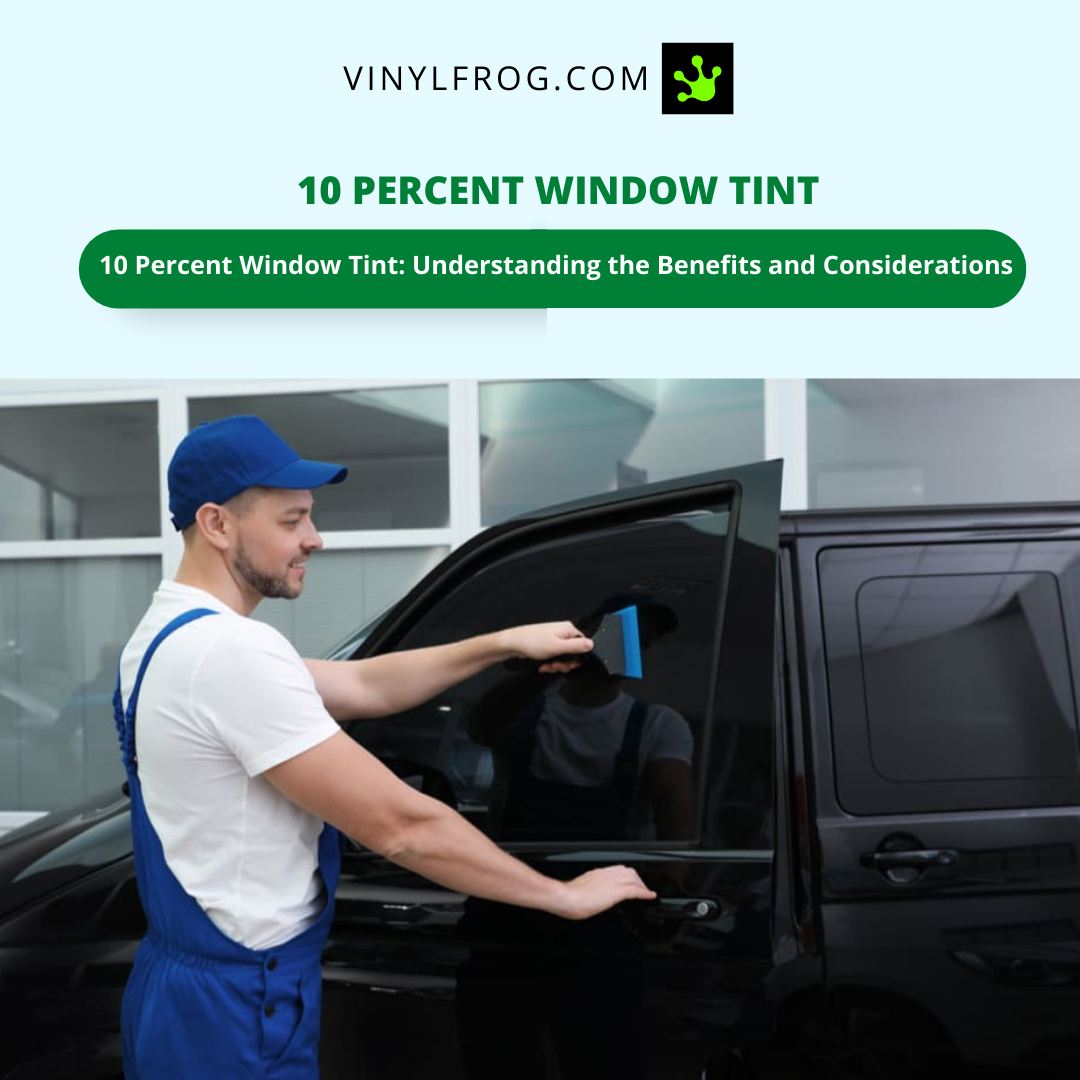
10 Percent Window Tint
15% VLT: Unlike other tints, this window film is legal on the backside and rear windows of vehicles in some states. It offers all the benefits that 0% and 10% have with more visibility and functionality. 15% tint is also a great way to add some aesthetic appeal to your car.
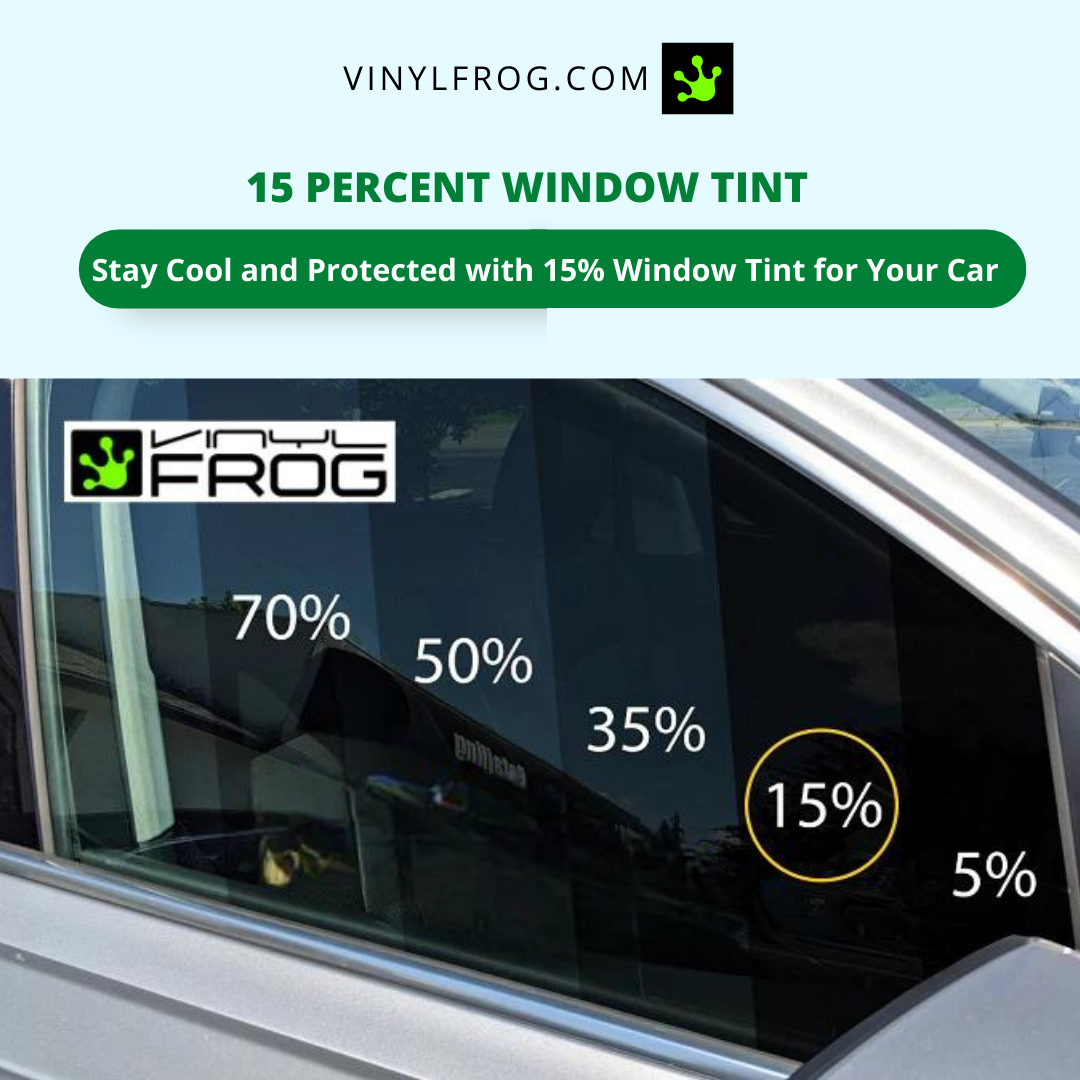
15 Percent Window Tint
25% VLT: 25% window tint effectively reduces glare, making it easier and safer to drive or work in bright conditions. Moreover, it also has night visibility which the previous tints do not possess.
With its ability to provide moderate privacy, glare reduction, UV protection, and temperature control, it offers a versatile solution. Just like 15% VLT, this tint is only legal for rear or side windows in certain states and illegal otherwise.
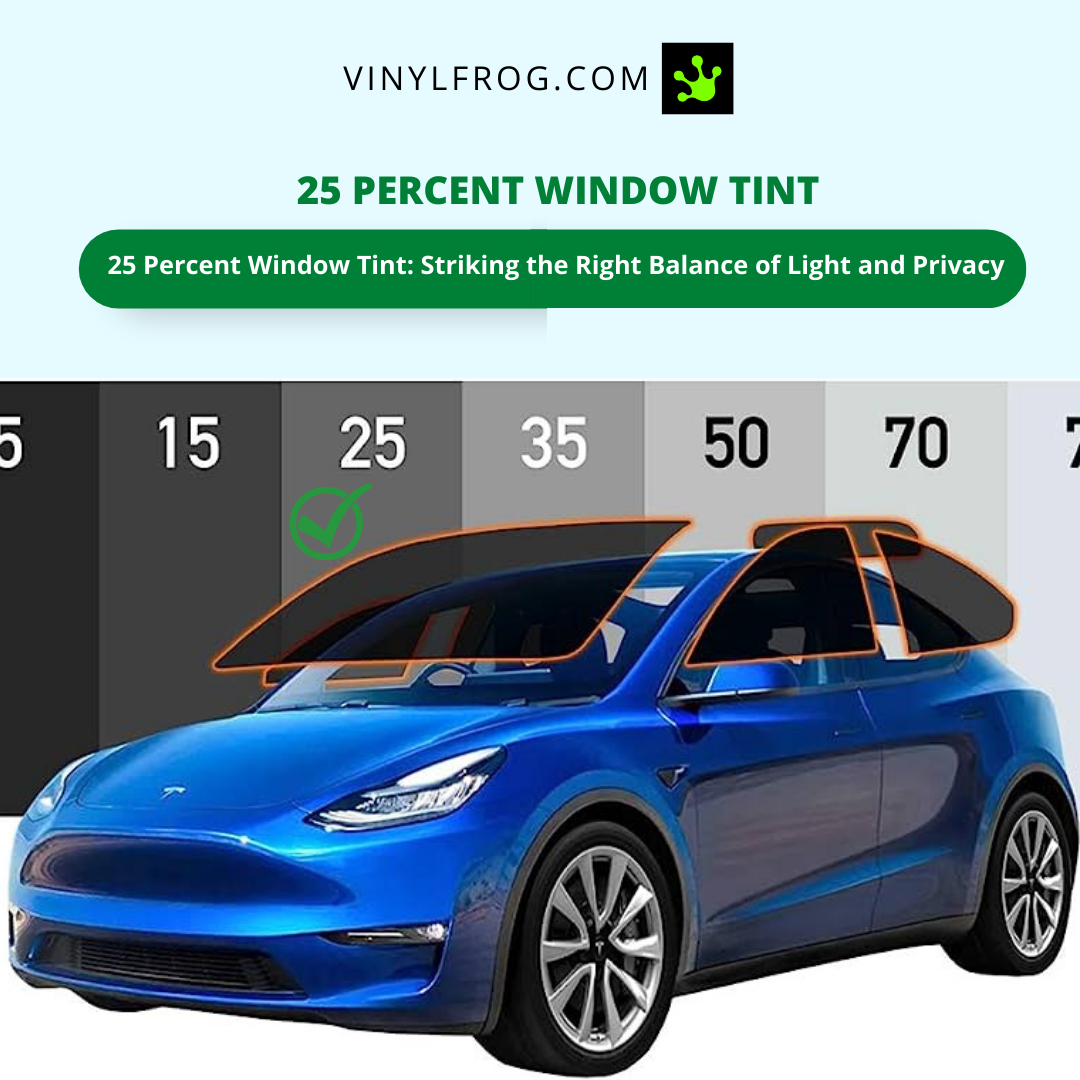
25 Percent Window Tint
30% VLT: This tint will not get you in trouble with the law as most states declare tints 30% and upwards as legal. The night visibility is ideal without compromising on UV protection, heat, and glare reduction.
You will find that even at this percentage your safety and privacy is guaranteed as any onlooker will find it hard to peer inside the vehicle. Also, the slightly darker shade adds a touch of elegance and sophistication, giving a sleek and polished appearance.
Overall, 30% tint has a lot of benefits due to its legality.
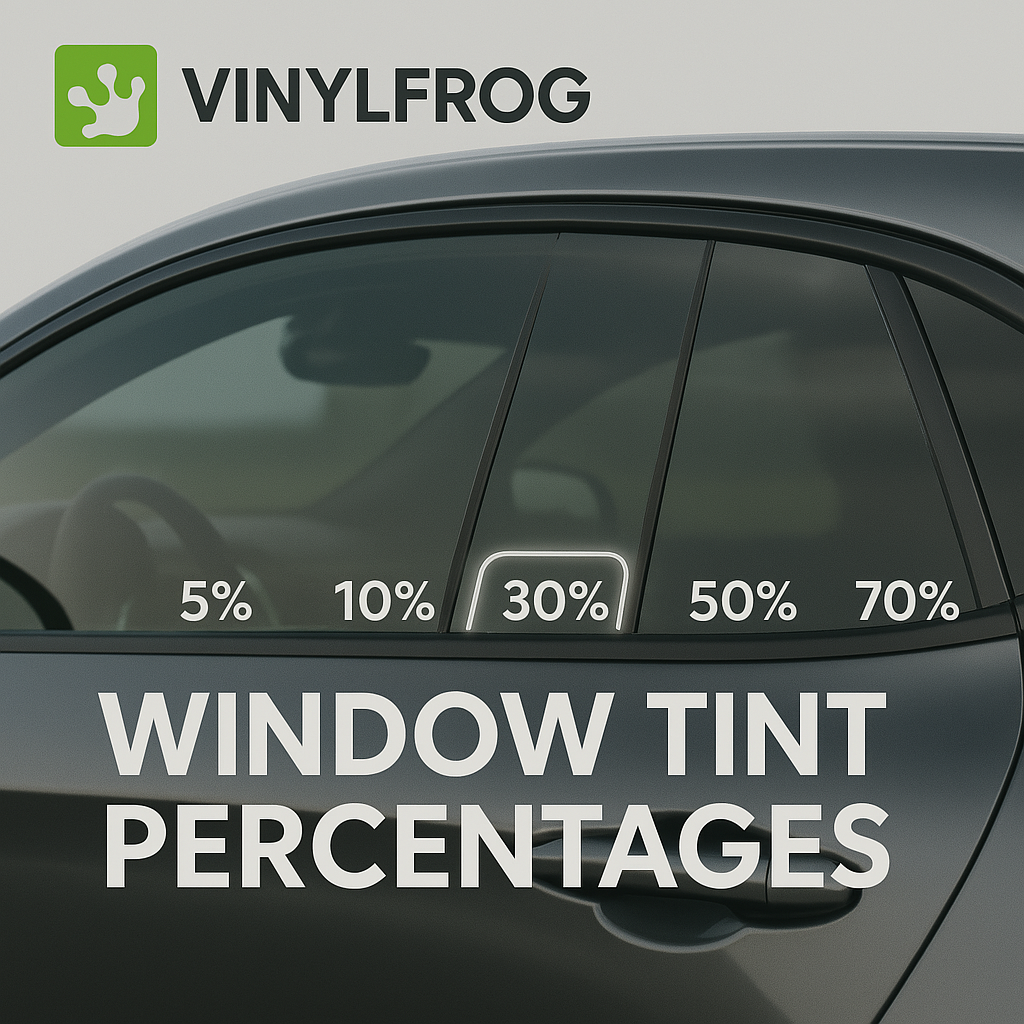
30 Percent Window Tint
Word of Caution: Before opting for any tint percentage, it is important to check the law in your state and those that you frequently visit. The darkness of the tint should comply with it as you would not want to get in trouble with the local authorities.
The Cost Of Car Window Tinting
Most of the products we have listed cost between $59-$699 depending on the size of the film you get. However, the total cost may come out to be different than what you expect. The cost of window tinting depends on factors such as:

- The type of tint (ceramic coated being the most expensive, followed by carbon and dyed).
- The quality of the tint film.
- The size and model of the vehicle.
- The style, shape, and size of the windows.
- The charges of professional window tint installers and the state you belong to.
Warranties are provided by some manufacturers, and while they do not cost extra, they ensure that any liabilities are taken care of within the warranty period. While it may seem tempting to choose cheaper options, skimping out on window tints will cost you more in the long run.
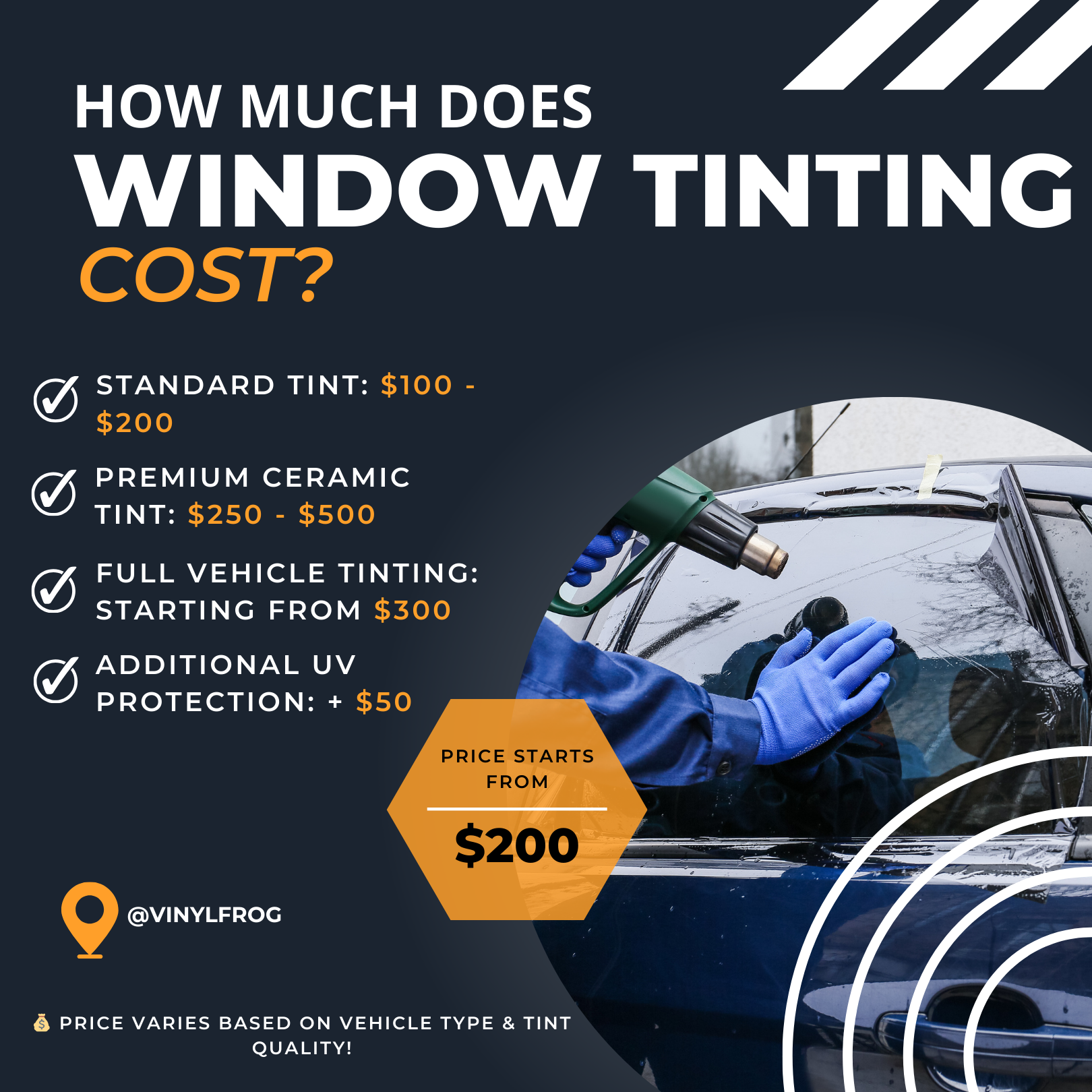
How Much Does Window Tinting Cost?
This is due to the fact that low quality tints fade faster and are not shatterproof. You will need to replace them frequently which will make these tints more of a liability than an investment.
Another tip is to opt for professional services. These professionals have skills and years of expertise.
Applying the tint yourself could lead to undesirable outcomes so leave this to the experts. Moreover, some states have strict laws about tinting that professionals are aware of so you will not get into any trouble either. For these services, you can expect to pay anywhere between $100-$900.
How To Apply Car Window Tint?
The application of window tint is a job that is better left to the experts. It requires skill and precision if you want a long lasting performance. We present to you the process in a nutshell:

How To Tint Car Windows? Step-By-Step Guide
- Prepare and clean the window. There shouldn’t be any dirt, dust, grease or other contaminants on or around the window. Clean the area and the interior of the vehicle too.
- Unroll the tint film. Spray soapy water on the outside of the window and place the tint on the entire window to measure leaving an extra 2 to 3 inches from the edges. Do not remove the liner.
- Cut the tint film according to the size you have measured. Spray the inside glass of the window with soapy water. Peel off the top half of the liner from the adhesive side of the window tint film. Spray the adhesive that is now exposed with soapy water.
- Roll down your window slightly and line up the adhesive side of the tint film with the glass of the window. If the water starts to dry up, spray again to make the surface wet. Scrape out the creases and bubbles to the outside edges using a squeegee.
- Once you are sure that the upper half of the tint film has been positioned and applied correctly, roll the window up. Remove the liner from the bottom half of the film, spray with soapy water and apply the film.
- As you reach the edges, use a squeegee to tuck the film in. Once again, spray the surface with soapy water all over and remove any creases or bubbles in the film. Repeat the process with all windows.
This is a brief description of how a window tint is applied. We would like to reiterate again that if you do not have the necessary knowledge, tools, practice and expertise, leave the job to the professionals for a perfect finish.
How To Remove Bubbles From The Car Window Tint?
Your car window tint might get bubbles after being installed due to quite a few reasons. It might be because of improper preparation before applying the tint, incorrect installation, poor quality of the film or changes in the environmental temperature.
You can remove these bubbles from the tint by heating it up a bit using a heat gun. This will make the tint more flexible.
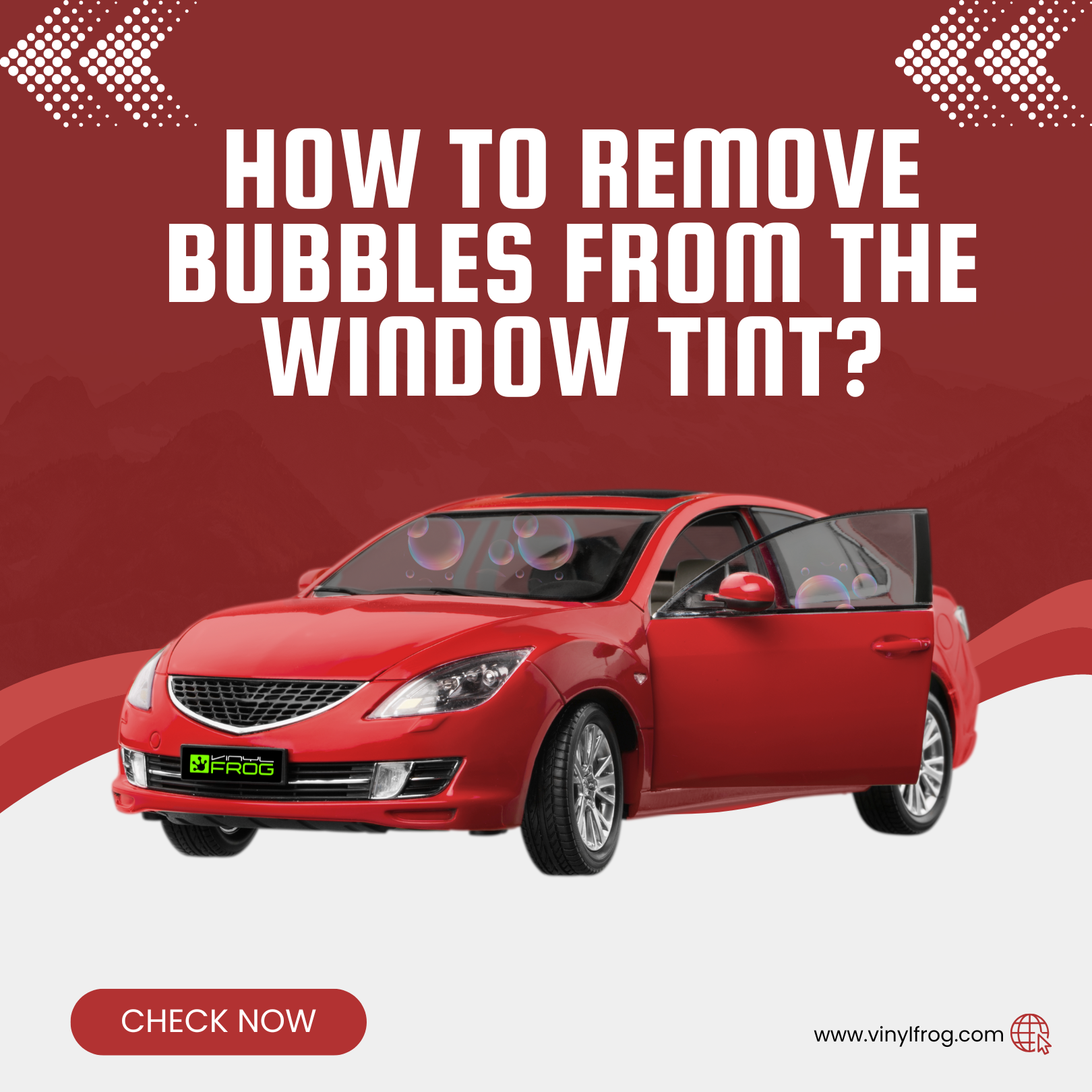
How To Remove Bubbles From The Window Tint?
Spray a mixture of dish soap and water on the warm tint. Now pop the bubbles with an air release pen. Take a squeegee and gently smooth them out. You can remove all the bubbles this way but be very slow and gentle.
The Legality Of The Car Window Tint
When opting for a window tint, this is the most important aspect that one should take care of. There are different laws regarding car window tinting in different states. These rules are intended to make it simpler for police officers to function safely in any emergency situation.
If you break your state's tinting rules, you may receive a penalty and be ordered to uninstall the tint. You will not only have to follow the rules of the state where you reside, but if you frequently travel by road to other states, you will have to take into account their laws as well.
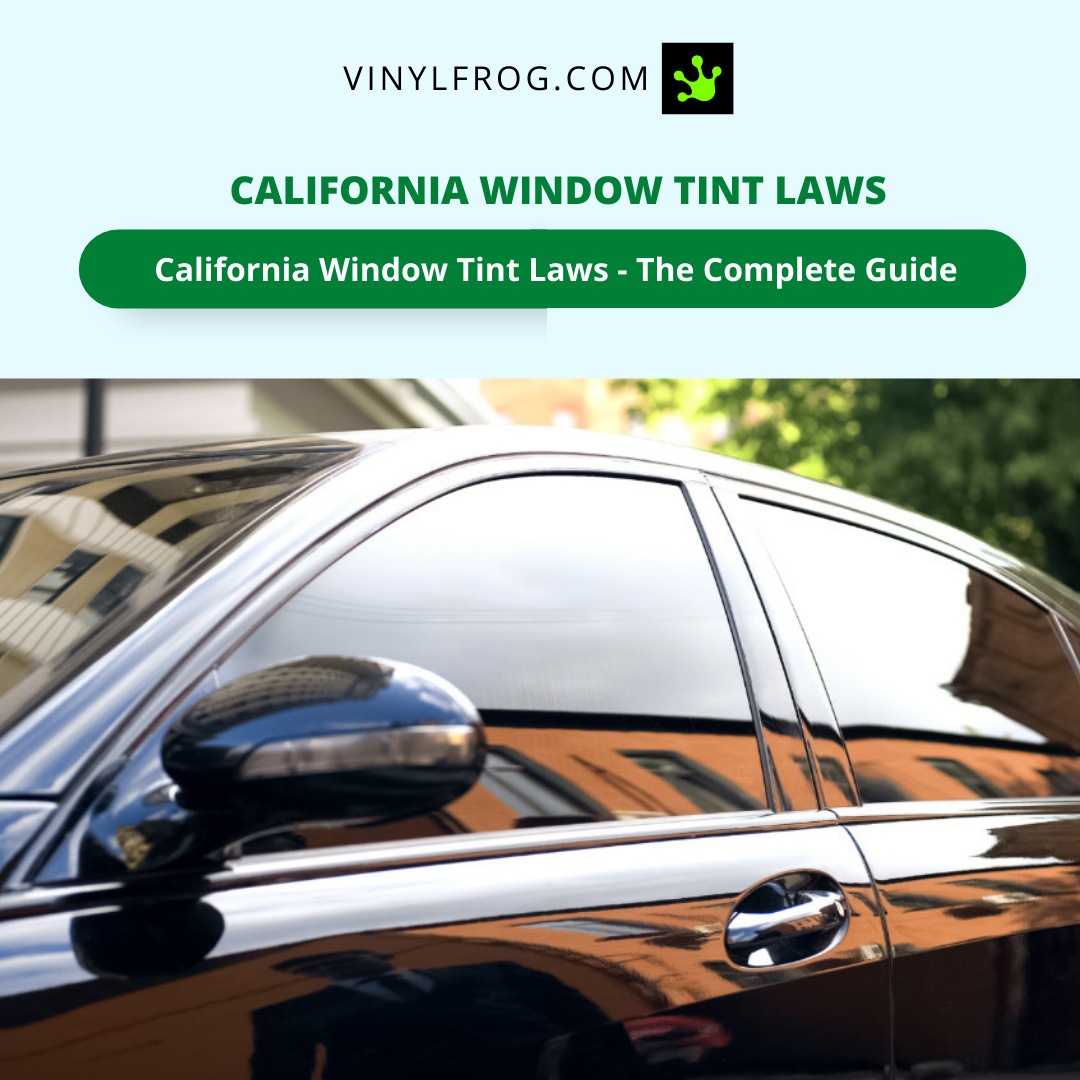
California Window Tint Laws - The Complete Guide
Most of the states allow tinting the top five inches of the front windshield which is known as the AS-1 line. There are strict laws regarding the front windows, which are on either side of the driver. Some states allow 70% VLT while others allow 35% on these.
One must know these rules to avoid getting in trouble with the law enforcement officers. As for the rear windows and the rear windshield, most of the states have relaxed rules. Some allow tints of any level of darkness to be applied on these, while others mention a specific VLT percentage.
Whatever the case might be, it is important to know the restrictions before window tint installation.
Medical Exemption For Window Tints
In most of the states, the laws regarding window tinting do not apply to those individuals who have a medical condition that compels them to stay away from the sun. This includes Systemic Lupus Erythematosus, Cockayne Syndrome, Solar Urticaria, Albinism and so on.
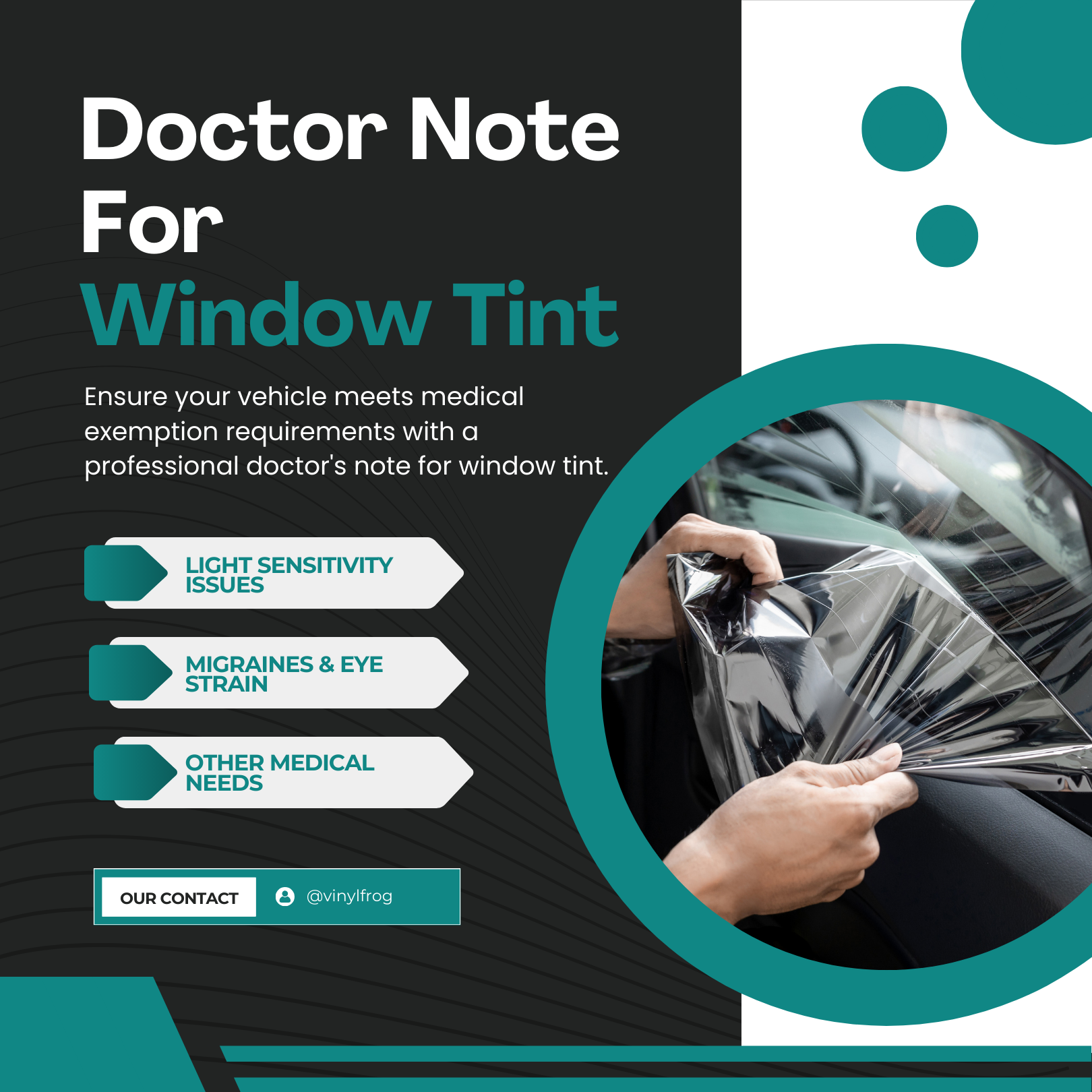
Doctor Note For Window Tint
In order to avail this exemption, one must carry a medical note from a registered practitioner in the vehicle at all times to show to the officer.
But be vary, there are certain states that do not allow dark tints even if you have a medical condition, hence it is imperative to be well versed in the laws of the state regarding car window tinting.
Caring for Your Car Window Tint
In order to make the most of your window tint and get the best value for money, one must take care of it by taking the following steps:

- Let the newly applied film cure. If you have just installed it, do not roll down the windows and take your car out for a ride exposing it to dust and debris.
- Use the right cleaning products. Your cleaner should be ammonia free. Mild soap is ideal for cleaning windows. Use a soft microfiber cloth to prevent scratches and scuffs.
- Wipe the tinted surface in a gentle, circular motion to remove dirt and grime. Avoid applying too much pressure as it can cause damage. Pay attention to the edges and corners of the tinted area, as they are more vulnerable to lifting or peeling.
- Extreme temperatures, such as very high heat or freezing cold, can affect the tint's adhesive properties. Park your vehicle in shaded areas when exposed to direct sunlight for a prolonged period. In winter, allow the defrosters to warm up the windows gradually rather than using ice scrapers or pouring hot water on them.
- If you see any imperfections in your window tint, visit a professional immediately to get it fixed.
How To Remove A Car Window Tint?
If your tint has discolored or it has bubbles in it or it is not according to the law, you might want to remove it. Here’s how you can do so:
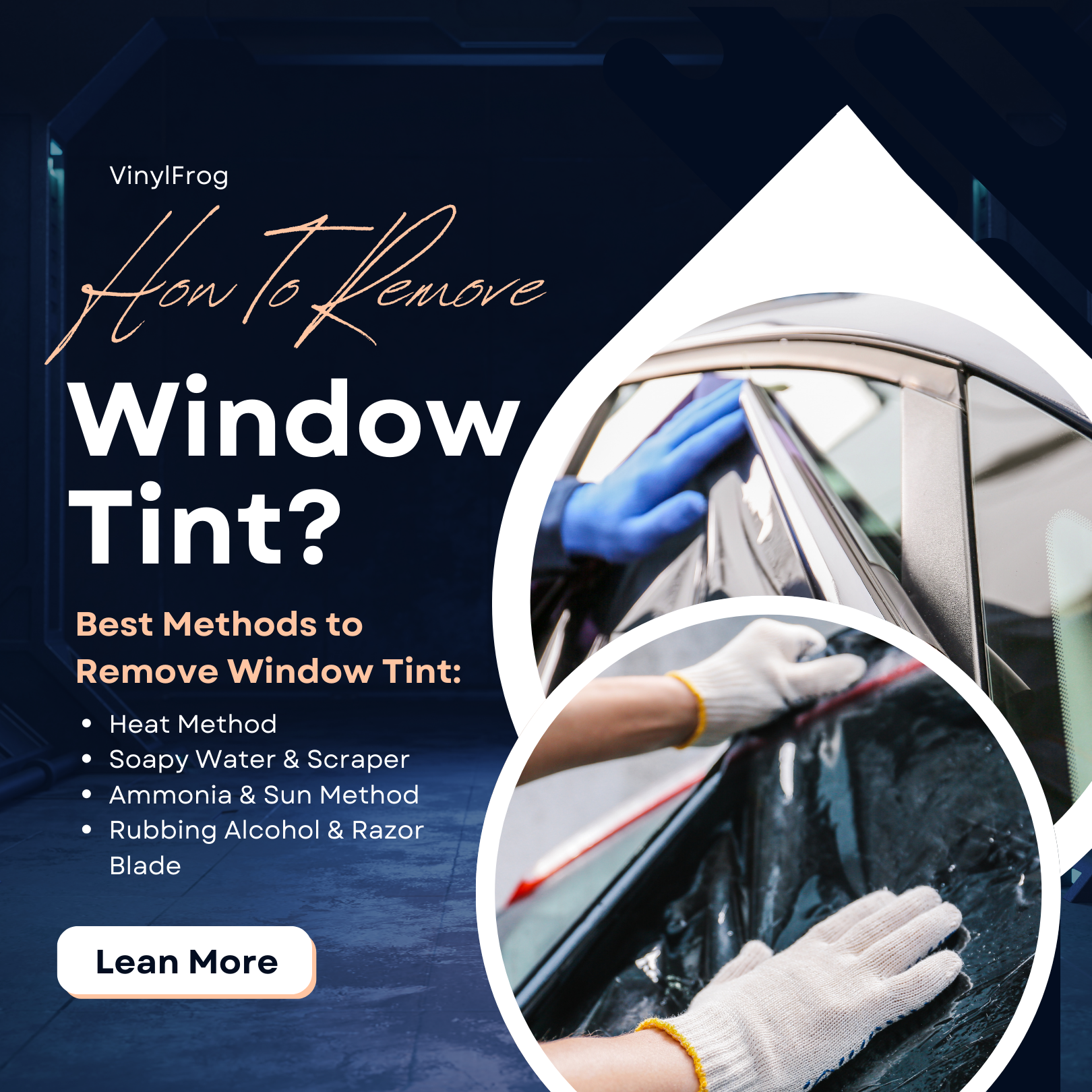
How To Remove Window Tint?
- Method 1: Apply heat to the edge of the car window tint. This will cause the glue behind the tint to melt. Use a razor or any pointed item near the edge of the tint to begin peeling it off after the glue has loosened. Be careful not to leave scratch marks on the glass.
- Method 2: Apply a soapy solution made with warm water to the window. Wrap it with a newspaper. Apply more soapy water on the newspaper. When you feel the surface is drying, apply more warm soapy water. Use a non-metallic squeegee to remove the newspaper after a few hours; doing so will also remove the tint.
- Method 3: Apply steam to the window tint using a simple hand-held steamer. This will loosen the adhesive. Use a razor blade scraper to get behind the tint and push it down. You have to lift it off the glass and then peel away.
There are other methods of taking off the window tint as well, however, we recommend letting a professional handle it so that no scratches are left on the glass of the window and the tint is removed smoothly.
Frequently Asked Questions
Car Window Tints - Final Words
Window tints are the solution to numerous problems you encounter on the road. From glare, robberies, sun exposure to accidents, these films cover all aspects. They are a wonderful investment that maintains the look and value of your prized possession.
If we have convinced you to get one as soon as possible, head over to our Vinyl Frog website to select the finest tints in the market. You can also check out more of our blogs on tinted windows and other topics if you require additional information.




